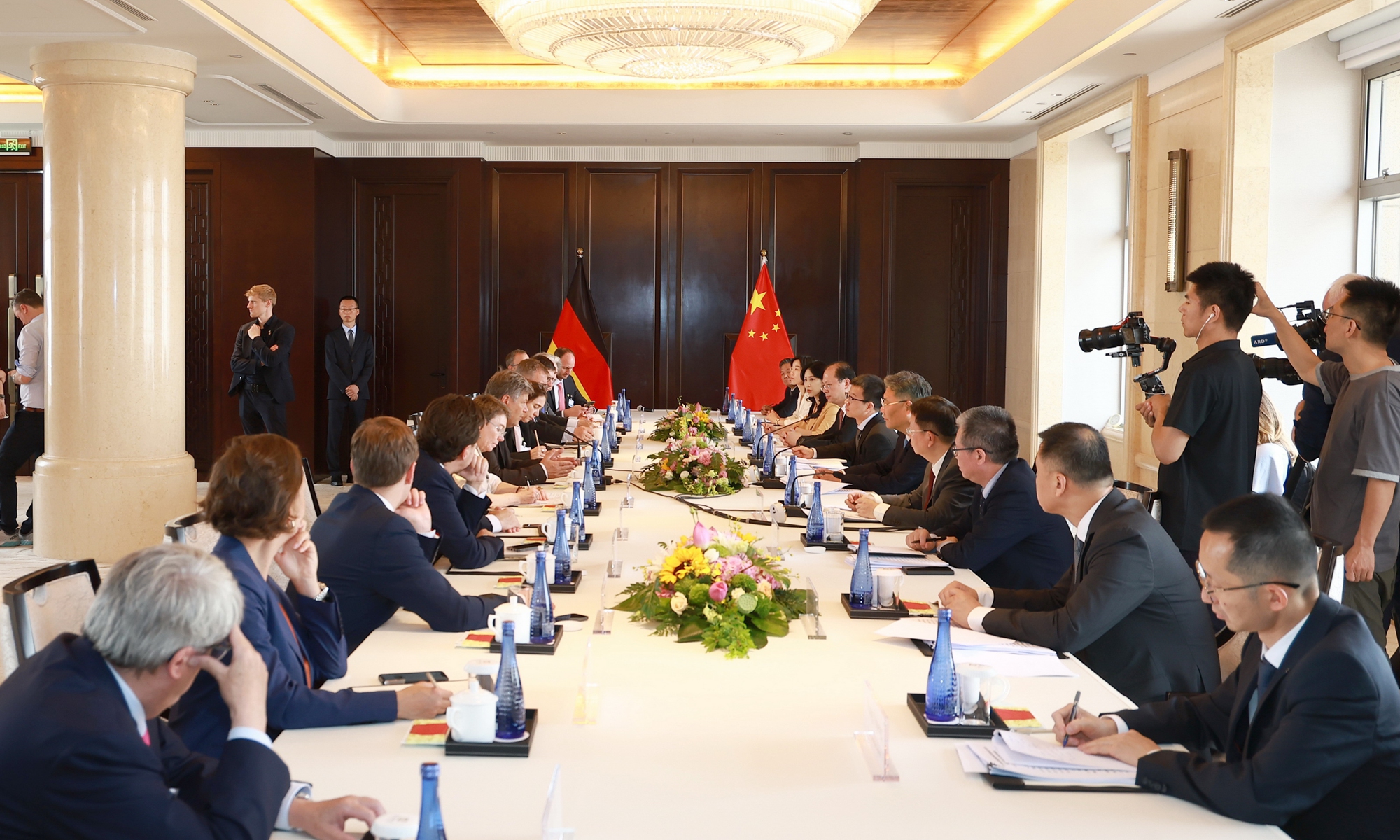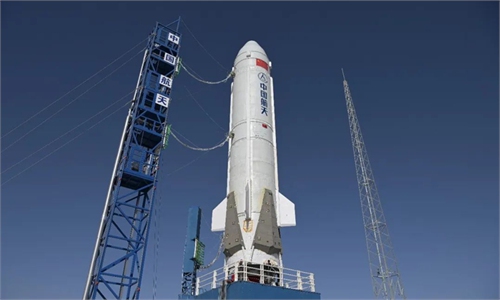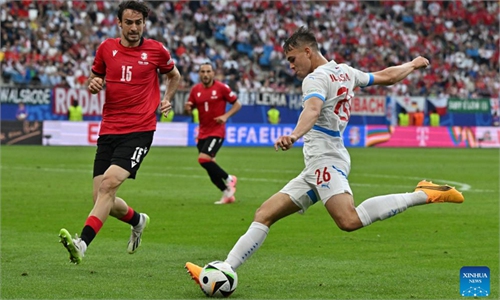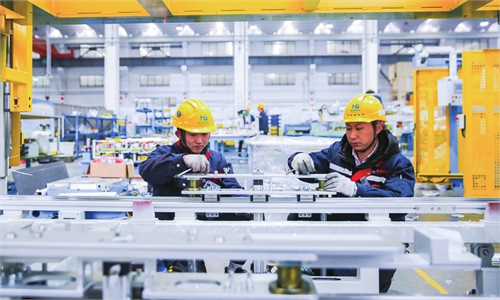Habeck expected to act as ‘coordinator’ over potential China-EU trade row during visit

China's Commerce Minister Wang Wentao met with German Economy Minister Robert Habeck on Saturday Photo:Courtesy of MOFCOM
If the EU insists on imposing additional tariffs on Chinese electric vehicles (EVs), China will take all necessary actions to defend its own interests, China's commerce minister told German Economy Minister Robert Habeck on Saturday. The German minister's visit to China is likely to serve as a coordinator and negotiator as Beijing and Brussels are mired in a trade row, experts said, noting that this visit may help Germany to seek a balance to avoid disruptions to its own domestic economy.
Moreover, the visit in China to enhance cooperation carries vital importance for Habeck in finding a solution for Germany's staggering economy. If he sticks to ideological prejudice, the visit may yield fewer results than expected, observers warned.
China's Commerce Minister Wang Wentao met with Habeck on Saturday.
Regarding the EU's announcement of plans to impose additional tariffs on Chinese EVs starting from July 4, Wang said that "if the EU is sincere, China hopes to start negotiations as soon as possible; if the EU insists on its own way, China will take all necessary actions to defend its own interests."
Habeck also was quoted by Chinese media as saying that Germany has benefited greatly from trade with China, but the rise of trade protectionism is worrysome.
Zheng Shanjie, director of the National Development and Reform Commission (NDRC), met with Habeck in Beijing on Saturday.
The so-called "overcapacity" argument in China's new energy industry goes against market laws and economic common sense, read a statement from NDRC.
The EU's imposition of additional tariffs on Chinese electric vehicles (EVs) is inconsistent with the EU's high banner of "green development." Protectionism will only hinder global efforts to address climate change and promote green and low-carbon transformation. China will take all measures to safeguard the legitimate rights and interests of Chinese enterprises, NDRC said.
Currently, global production capacity of new energy vehicles cannot meet market demand, and China's new energy vehicles can make a greater contribution to promoting a global and green low-carbon transformation, it said.
China is willing to take the opportunity through this dialogue to further enhance cooperation with Germany in key areas such as energy efficiency and circular economy, climate multilateral processes, industrial decarbonization, and energy transition, the NDRC noted.
China has long been committed to high-level opening-up to the outside world, creating a favorable business environment for foreign enterprises, including German companies, to develop in China. China is willing to maintain close contact with Germany, play to complementary advantages, explore cooperation potential, and achieve more fruitful results, Chinese Minister of Industry and Information Technology Jin Zhuanglong told Habeck on Saturday.
Proposed EU tariffs on Chinese goods are not a "punishment," Habeck told Zheng, according to a Reuters report.
Habeck's visit to China is the first by a senior European official since Brussels proposed hefty duties on imports of Chinese-made EVs.
China's Ministry of Commerce said on Friday that the EU bears full responsibility, as it has continuously escalated trade frictions with China, which could trigger a "trade war," in response to media reports of various industries in the EU expressing concern about a broader trade conflict with China.
Calling Habeck's remark a "defense" for the EU's reckless behavior, Sun Keqin, a research fellow at the China Institutes of Contemporary International Relations, told the Global Times that at least the German minister's visit will help EU better understand China's stance and enhance understanding.
Experts have stated that Habeck's visit presents both a challenge and an opportunity for Germany. Berlin must navigate the task of defending the EU while also maintaining a positive relationship with China. Germany has the potential to mitigate the negative effects of China-EU trade tensions, as the two countries share a wide range of cooperation opportunities, particularly within the new energy sector.
Habeck is set to discuss climate and longstanding trade issues, including fair competition for German companies and transparent public tenders. His itinerary includes visits to the BMW research center in Shanghai, discussions with Chinese students in Hangzhou, and a scheduled visit to e-commerce giant Alibaba, according to German media.
The German delegation, led by Habeck, will likely to serve as coordinators and engage in negotiations with the China before so-called anti-subsidy probe into Chinese EVs concludes, Zhao Yongsheng, a research fellow of the Institute of Regional and International Studies at the University of International Business and Economics in Beijing, told the Global Times.
Zhao said the German delegation may try to understand the extent to which China is willing to accept tariff adjustments in order to reach some consensus. Considering the impact on businesses and employment, the Germany may seek a balance to avoid causing significant disruptions to relevant industries.
China strategy needs 'an update'
"Sooner or later the China strategy needs an update," Habeck said at a reception at the German embassy in Beijing on Friday. Habeck said the country's China strategy lacks direction on how it sees the medium-term relationship between the two partners, Reuters reported.
The second problem was that it was the German government's China strategy and missed the European approach, he said. "That would be an even bigger challenge because honestly we would have very easily 27 China strategies," he said.
Berlin last year agreed its first ever strategy on China, which called for 'de-risking' of the two countries' economic relationship, calling Beijing a "partner, competitor and systemic rival".
Including more European angle into Germany's China strategy signals that Habeck wants to shift China policy toward a more competitive and confrontational approach, Sun commented.
However, as head of economic affairs, Habeck cannot shake off its responsibility of German's staggering economy, experts noted. Therefore, he needs to use this visit in China to further expand and deepen bilateral economic and trade relations.
Habeck is well advised to set aside its political and ideological prejudice, otherwise his China visit will end up with less progress than he expected, said experts.



